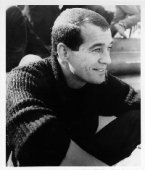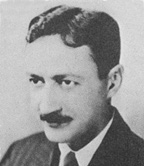 From the Editor
From the Editor
Charles Drew, Jean Toomer, Julian Bond and "Choices"
By Charles Michael Byrd
(Photo by Lynn Goldsmith)
 Last month's "Letters to the Editor" produced a white-hot argument between A.D. Powell and Heather Aston over Dr. Charles Drew (1904-1950) and the choices he and others like him had and made relative to "racial" self-identification. Dr. Drew clearly was a blended or mixed-race individual, though he identified as black. Ms. Aston asserted that any attempt to identify Dr. Drew otherwise would be revisionist, as he never publicly called himself anything else. With sincere respect to Heather, however, her technically correct argument is disingenuous.
Last month's "Letters to the Editor" produced a white-hot argument between A.D. Powell and Heather Aston over Dr. Charles Drew (1904-1950) and the choices he and others like him had and made relative to "racial" self-identification. Dr. Drew clearly was a blended or mixed-race individual, though he identified as black. Ms. Aston asserted that any attempt to identify Dr. Drew otherwise would be revisionist, as he never publicly called himself anything else. With sincere respect to Heather, however, her technically correct argument is disingenuous.
Owing to Jim Crowism and pressures from within the black community, people like Dr. Drew, Walter White, Jean Toomer, Anatole Broyard and countless others had two choices -- be black or "pass for white." Those who were not light enough for the latter didn't even have that choice. Now, many hit the ground running with a black identity, never questioning it, the instant they crossed the threshold of the channel of life. Others spurned blackness and pursued careers as members of the Caucasian persuasion, and it is my personal opinion that no one has the moral authority to cast aspersions upon anyone who passed. People need to realize that their choices are not necessarily other people's choices, and one person's evaluation of what he needs to do to survive and prosper in life -- provided he does not infringe upon the rights of another -- is solely his business.
 |
 |
 |
 |
| Charles Drew |
Walter White |
Anatole Broyard |
Jean Toomer |
There was also an in-between group, of which Dr. Drew may have been a member, though Jean Toomer certainly was. At some point in their lives, the deeply introspective, spiritually aware members of this group stop dead in their tracks and, in the solitude of their stillness, question the staggering discrepancy between image in the mirror versus societally imposed identity. Toomer did, and Dr. Drew may have also.
Drew had to have known, though, that there was a price to pay for "running away from blackness," the inane accusation made against self-identified multiracials even as we approach a new millennium. (Even the self-appointed "leaders" of the multiracial community have consistently and maliciously denigrated the idea -- and those advancing it, including yours truly -- of an individual refusing to allow society and the government to locate him or her within mutually exclusive and artificial "racial" categories as "radical.") Though Jean Toomer was incredibly straightforward and candid about not wanting to be called colored or white, to this day some view him as having felt he was too good to be black.
(Conceding that race is fiction, some folk now quickly assert that "black" is a "cultural" rather than "racial" identifier. The reverse argument is that American society is a mulatto culture, having been "racially mixed" for centuries. In this light, "black," "Hispanic," "white," et al. are seen as mere second-tier political appellations, modifying the first-tier affiliations: a Hispanic Democrat/Liberal, a black Republican/Conservative, a white Libertarian/Moderate, etc.)
As authors Cynthia Earl Kerman and Richard Eldridge write in "The Lives of Jean Toomer: A Hunger for Wholeness":
"Toomer's position against separateness and racial definitions was maligned both during his lifetime and later. One of the kindest things said about his racial stance by a black critic is Alice Walker's comment in her review of The Wayward and the Seeking:
'Cane' was for Toomer a double 'swan song.' He meant it to memorialize a culture he thought was dying, whose folk spirit he considered beautiful, but he was also saying goodbye to the 'Negro' he felt dying in himself. 'Cane' then is a parting gift, and no less precious because of that. I think Jean Toomer would want us to keep its beauty, but let him go.
"The implication is that an individual has to be on one side of the line or the other. The prevailing American attitude still is that the line between black and white is inexorable and that if one is a little bit black, one is all black."
University of Iowa professor Darwin T. Turner, in the 1975 introduction to the paperback version of Cane refers to Toomer as being "ranked among the finest artists in the history of Afro-American literature," notwithstanding Jean's insistence that he was simply an American.
Nobel Prize winning author Toni Morrison, in an Associated Press interview from January promoting her newest work -- "Paradise" -- committed quite a gaffe by referring to Toomer as one of the "black" writers who affected her the most. True to form, no one said a word about that, but can you imagine the ensuing brouhaha if she had referred to Charles Drew as one of the preeminent mixed-race physicians of the Twentieth Century? My God! Jesse Jackson and Kweisi Mfume would have popped up on the Sunday morning news shows professing that Drew was indeed an "authentic black!" and that "a vast right-wing conspiracy" -- offering their best Hillary Rodham Clinton impersonation -- had co-opted Ms. Morrison into helping it gut affirmative action! (Such has always been the "civil rights" community's simpleminded take on the mixed-race initiative.)
In "Neither White Nor Black: The Mulatto Character in American Fiction" (New York University Press, 1978), Judith Berzon writes in the chapter The Mulatto as Race Leader:
Since, as we have seen, the mixed blood has even greater reason to identify with the dominant caste than does his full-blooded brother, his identification with the lower caste must be developed and nurtured. "By losing himself in a cause larger than himself," Everett Stonequist explains, "the marginal nationalist overrides, if he does not solve, his own personal conflicts." Stonequist theorizes that a primary cause of the mulatto's emergence as a leader of his race is "the disparity between his aspirations and his status"; this disparity will "make him the kind of marginal man who integrates his personality through reacting back to the Negro group and working to raise its status."
 Ergo, we see that mitigating factors influenced the decision of whether to both choose and openly proclaim a black or white identity: 1-) ridicule and claims of ownership from the black community (persisting to this day), and 2-) a desire to raise the status of one's "black brethren" -- due not just to the likelihood of the mulatto's having had a superior education but also to a regrettable resignation to one's station in life. To deny this would be no less revisionist than to say Dr. Drew (or even the new NAACP Chairman of the Board, newslinked photo right) claimed to be multiracial.
Ergo, we see that mitigating factors influenced the decision of whether to both choose and openly proclaim a black or white identity: 1-) ridicule and claims of ownership from the black community (persisting to this day), and 2-) a desire to raise the status of one's "black brethren" -- due not just to the likelihood of the mulatto's having had a superior education but also to a regrettable resignation to one's station in life. To deny this would be no less revisionist than to say Dr. Drew (or even the new NAACP Chairman of the Board, newslinked photo right) claimed to be multiracial.
PASS IT ON!
©2001 all rights reserved.
Reproduction in whole or in part prohibited without
the express written consent of Interracial Voice.
 Last month's "Letters to the Editor" produced a white-hot argument between A.D. Powell and Heather Aston over Dr. Charles Drew (1904-1950) and the choices he and others like him had and made relative to "racial" self-identification. Dr. Drew clearly was a blended or mixed-race individual, though he identified as black. Ms. Aston asserted that any attempt to identify Dr. Drew otherwise would be revisionist, as he never publicly called himself anything else. With sincere respect to Heather, however, her technically correct argument is disingenuous.
Last month's "Letters to the Editor" produced a white-hot argument between A.D. Powell and Heather Aston over Dr. Charles Drew (1904-1950) and the choices he and others like him had and made relative to "racial" self-identification. Dr. Drew clearly was a blended or mixed-race individual, though he identified as black. Ms. Aston asserted that any attempt to identify Dr. Drew otherwise would be revisionist, as he never publicly called himself anything else. With sincere respect to Heather, however, her technically correct argument is disingenuous.




 Ergo, we see that mitigating factors influenced the decision of whether to both choose and openly proclaim a black or white identity: 1-) ridicule and claims of ownership from the black community (persisting to this day), and 2-) a desire to raise the status of one's "black brethren" -- due not just to the likelihood of the mulatto's having had a superior education but also to a regrettable resignation to one's station in life. To deny this would be no less revisionist than to say Dr. Drew (or even the new NAACP Chairman of the Board, newslinked photo right) claimed to be multiracial.
Ergo, we see that mitigating factors influenced the decision of whether to both choose and openly proclaim a black or white identity: 1-) ridicule and claims of ownership from the black community (persisting to this day), and 2-) a desire to raise the status of one's "black brethren" -- due not just to the likelihood of the mulatto's having had a superior education but also to a regrettable resignation to one's station in life. To deny this would be no less revisionist than to say Dr. Drew (or even the new NAACP Chairman of the Board, newslinked photo right) claimed to be multiracial.